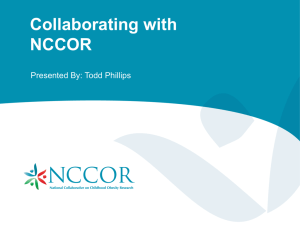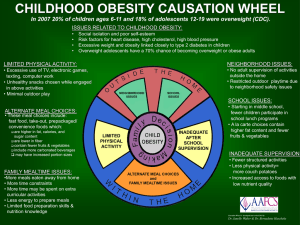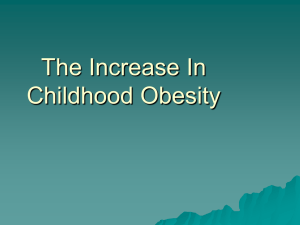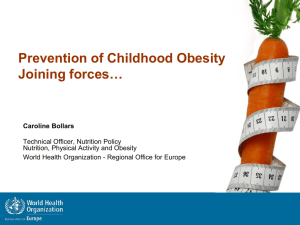Commission on Childhood Obesity Prevention
advertisement
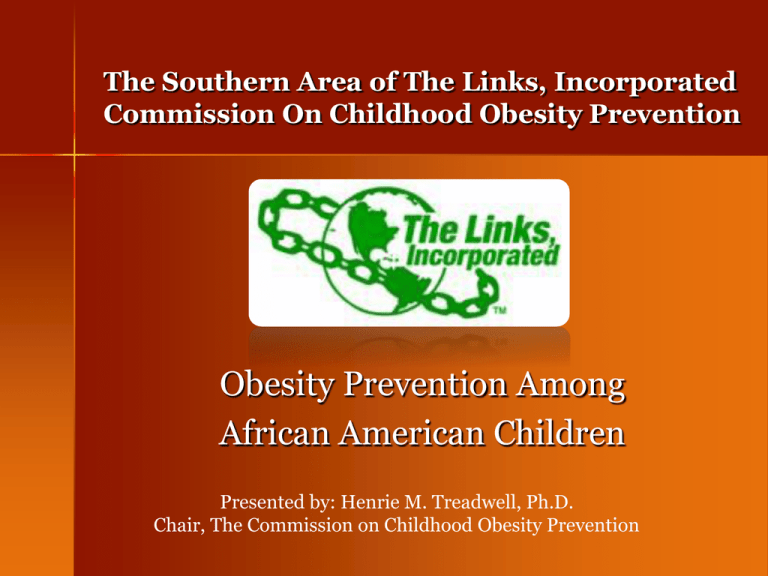
The Southern Area of The Links, Incorporated Commission On Childhood Obesity Prevention Obesity Prevention Among African American Children Presented by: Henrie M. Treadwell, Ph.D. Chair, The Commission on Childhood Obesity Prevention Call To Action on Childhood Obesity History and Background May 2007-Area Director Announces Childhood Obesity - Focused Program Initiative February 2008-Childhood Obesity Initiative officially launched Summer 2008-Produced a documentary on chapters’ work and established partnership with Community Voices of Morehouse School Of Medicine October 2008-Co-hosted Inaugural Meeting of The Commission On Childhood Obesity Prevention (COCOP) May 2009- Impaneled The COCOP October 2009- Co-hosted Meeting of The COCOP The Commission On Childhood Obesity Prevention Created to address the underlying causes of childhood obesity among African-American children through research, education, and advocacy. Commission Goals Establish a culturally tailored evidence-based framework for improving the health and well-being of African-American children as it relates to obesity prevention. Heighten awareness and expand the knowledge base of obesity and diabetes-related research, programs, and community based prevention strategies that can positively impact the lives of African American children. Identify and prioritize health policies which encourage healthier African American children and families. Inform, support and enhance collaboration, partnership development, and capacity building among stakeholders, organizations, and agencies that promote childhood obesity prevention. Special Advisors William H. Dietz, M.D., Ph.D. Director, Division of Nutrition, Physical Activity Obesity Centers for Disease Control and Prevention James R. Gavin III, MD, Ph.D. Clinical Professor of Medicine, Emory University CEO and Chief Medical Officer, Healing Our Village David Satcher, M.D., Ph.D. Director, Satcher Health Leadership Institute Morehouse School of Medicine Commissioners BROOK BELAY, M.D. Senior Service Fellow Division of Nutrition and Physical Activity The Centers for Disease Control TRIESTA FOLWLER-LEE, M.D. Medical Officer Public Information and Communications Branch of the Eunice Kennedy Shriver National Institute of Child Health and Human Development RODNEY S. LYN, PH.D., M.S. Assistant Professor Institute of Public Health Georgia State University CALVIN WAYNE MCLARIN, M.D. Clinical Associate Professor and Member Medical Advisory Board Morehouse School of Medicine TONI MODDY, M.D. Founder and Executive Director Health Masters Club JUDITH J. PICKENS, M.ED. Senior Vice President Program and Youth Development Services Boys & Girls Clubs of America AARON SHIRLEY, M.D. Chairman Jackson Medical Mall Foundation Director Community Health Services University of Mississippi Medical Center RUBY TAKANISHI, PH.D. President Foundation for Child Development in New York City HENRIE M. TREADWELL, PH.D. Chair Links Incorporated Commission on Childhood Obesity Director Community Voices and Men’s Health Initiative Research Professor Community Health and Preventive Medicine Morehouse School of Medicine JOSEPH L. WEBSTER, SR, M.D. Founder Comprehensive Center for Digestive and Nutritional Disorders AAMBASSADOR ANDREW YOUNG Humanitarian The Scale and Scope of The Work An Emerging Model vs. The Traditional Research Model Guided by Expertise, Experiences and Commitment of the Commissioners and Advisors Targeted on African-American Children Based on an approach that will determine what community based organizations should do and what policy makers must do to reverse and prevent childhood obesity African-American Children and Childhood Obesity Obesity rates have reached epidemic proportions among African American children, particularly among AfricanAmerican girls. In 2003-2004, African-American children between ages 6 -17 were 1.3 times as likely to be overweight than Non-Hispanic Whites (CDC, 2009). Gender specific data shows that: 24 percent of African-American girls between ages 6-11 were overweight as compared with 14 percent of their White counterparts (2003-2006) Source: National Survey of Children’s Health, 2007 African-American Children and Childhood Obesity (cont’d) 18.6 percent of African-American boys between ages 6-11 were overweight as compared with 15.5 percent of their White counterparts (2003-2006) 24.1 percent of African-American girls between ages 12-17 were overweight as compared with 14.6 percent of their White counterparts (2003-2004) 19.1 percent of African-American boys between ages 12-17 were overweight as compared with 19 percent of their White counterparts (2003-2004) (CDC, 2009). Source: National Survey of Children’s Health, 2007 States with The Highest Rates Of Overweight and Obese Children The states with the highest rates of children living in poverty have corresponding rates of childhood obesity. The states with the highest rates are Mississippi, Georgia, Alabama, Louisiana, South Carolina, North Carolina and Florida. These states comprise the Southern Area of The Links, Inc. Highest Rates Of Obesity by State States With Highest Rates of Overweight and Obese 10-to 17-Year Olds Rankings States Percentage 1 Mississippi 44.4% 3 Georgia 37.3% 6 Alabama 36.1% 7 Louisiana 35.9% 13 South Carolina 33.7% 14 North Carolina 33.5% 17 Florida 33.1% Health Consequences for Overweight Children First generation expected live sicker and die younger than their parents Higher Incidences of preventable diseases Diabetes Hypertension High Cholesterol Sleep Apnea Fatty Liver Psychological/Emotional Economic Consequences 1998-Medical Cost: $78.5 billion with roughly half financed by Medicare and Medicaid 2006-Increased prevalence of obesity of $40 billion including seven billion in Medicare prescription drug cost 2008-Estimates are that the Medical cost of obesity will equal $147 billion per year Source: Health Affairs 28, Number 5 (2009):W822-W831 Economic Burden of Diabetes 2007-Comprehensive Estimates suggest that the burden of pre-diabetes and diabetes reached $218 billion in 2007 --Estimate includes $153 Billion in higher medical cost --Estimate includes $65 billion in reduced productivity For each American, regardless of diabetes status, this burden represents a cost of approximately $700 dollars annually Source: Health Affairs 29, Number 2 (2010):297-303 Policy Implications The commission will address the following policy areas: Improve school nutrition Increase physical activity in schools Increase the availability of well-lit sidewalks, bike paths and parks in the community Address the development of community gardens to provide access to healthy produce Community Driven Policy Issues (e.g., Food Deserts) Intervening in Childhood Obesity Prevention: A Strategic Conversation With NACO Dialogue on collaboration, advocacy and policy FOR MORE INFORMATION: Southern Area Director Mary F. Currie masatech@mindspring.com Southern Area Program Coordinator Delores Bolden Stamps, Ph.D. boldenstamps@aol.com Chair, The Commission on Childhood Obesity Prevention Henrie M. Treadwell, Ph.D. htreadwell@msm.edu
